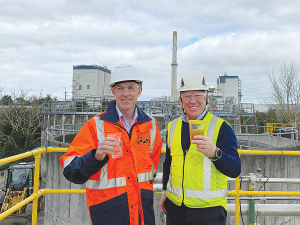Battle for milk
OPINION: Fonterra may be on the verge of selling its consumer business in New Zealand, but the co-operative is not keen on giving any ground to its competitors in the country.
 Fonterra chief operating officer Fraser Whineray (right) and Brent Sinclair, Waikato Regional Council at the Te Awamutu plant.
Fonterra chief operating officer Fraser Whineray (right) and Brent Sinclair, Waikato Regional Council at the Te Awamutu plant.
Fonterra is pouring $600 million in the coming years to reduce water use and improving wastewater processing at its milk plants.
The co-operative’s aims to take a leading industry approach on wastewater management.
As part of the upgrade, the co-op is investing $51 million to improve wastewater processing at their Te Awamutu site in the Waikato.
Fonterra Te Awamutu operations manager Russell Muir says the extensive wastewater upgrade is a positive step for the site and is part of the coop’s long-term sustainability goals.
“Reducing water use and improving wastewater at our manufacturing sites is a key part of our long term strategy, and over the next eight years the co-op will invest around $600 million on improvements.
“Our target is to improve wastewater management at our manufacturing sites by taking a leading industry approach.”
Construction on the project began last year, and while Covid-19 has presented some challenges over the course of the project, stage one construction has just been finished and environmental performance has already significantly improved.
This is the second major sustainability project the site has undertaken in recent years. Earlier this year it completed its first season on wood pellets rather than coal – helping the co-op reduce its carbon emissions by more than 11% last year.
The upgrade at Te Awamutu is one of the first wastewater projects being run by a newly established Wastewater Community. This new community is a partnership made up of key industry partners including PDP, Babbage, Beca, Vertex Engineers, Aurecon, Tetra Pak, Fulton Hogan and TEG.
Over the next 10 years, these partners will work together to share knowledge and expertise to make improvements on subsequent projects.
Fonterra says this will ultimately help the co-op to deliver on its environmental promises, by improving its existing wastewater management and performance.
Fonterra general manager water & environment Ian Goldschmidt says the co-op believes that a leading industry approach to wastewater quality requires a truly collaborative attitude.
“We know that we will need to do things differently to achieve our goals and are excited to have developed this crossindustry partnership, bringing together a well-respected group of subject matter experts. Water is precious taonga and it is up to all of us to do our bit to protect this valuable resource for Aotearoa,” says Goldschmidt.
“Throughout the project at Te Awamutu, we will be continuously looking for ways to improve – not only to implement within this project, but to share our knowledge with the wider Wastewater Community team.”
The World Wide Sires National All Day Breeds Best Youth Camp Best All Rounder plaudit has become family affair, with 2026 Paramount Cup winner Holly Williams following in her sister Zara's footsteps.
DairyNZ is giving New Zealand farmers a unique opportunity to gain hands-on governance and leadership experience within the dairy sector.
Herd improvement company LIC has posted a 5.2% lift in half-year revenue, thanks to increasing demand for genetics.
According to the latest Fresh Produce Trend Report from United Fresh, 2026 will be a year where fruit and vegetables are shaped by cost pressures, rapid digital adoption, and a renewed focus on wellbeing at home.
The Roar is a highlight of the game hunting calendar in New Zealand, with thousands of hunters set to head for the hills to hunt male stags during March and April.
OPINION: The past few weeks have been tough on farms across the North Island: floods and storms have caused damage and disruption to families and businesses.
OPINION: Fonterra may be on the verge of selling its consumer business in New Zealand, but the co-operative is not…
OPINION: What does the birth rate in China have to do with stock trading? Just ask a2 Milk Company.